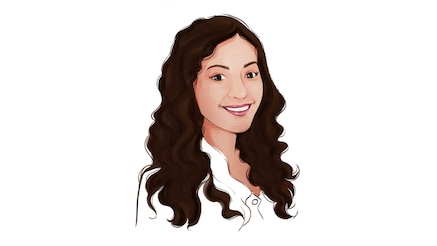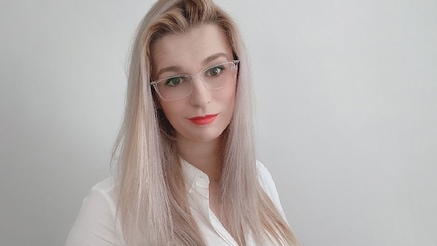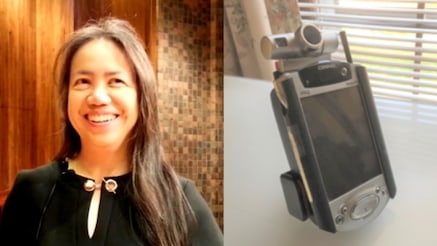Insights from a female tech pioneer
Real Conversations podcast | S4 E4 | May 26, 2022


Biography
Anne Lee works as a Chief Technology Office Partner in Bell Labs and was the recipient of the Bell Labs Fellow lifetime achievement award in 2005 for her pioneering work in the industry.
Women have a huge – but perhaps little known – role in the history of tech. They’re just beginning to get recognized in films and media on the subject. Yet they’re still a minority in STEM and are often overlooked through AI bias. Anne Lee, Bell Labs Chief Technology Officer Partner, provides her perspective.
Below is a transcript of this podcast. Some parts have been edited for clarity.
Michael Hainsworth: Ada Lovelace is considered the inventor of computer programming – back in the 1800s when men were designing steam powered computers and women were considered property… and at about the same time the great great grandfather of Bell Labs Chief Technology Officer Partner Ann Lee immigrated to Canada. Lee is the 2020 Ada Lovelace Honoree as a “pioneering software engineer” in telecommunications technology. Today Lee is speaking out about the importance of putting women back into the history books of computing.
Anne Lee: The Ada Lovelace honorary recognition is something that Nokia started a couple of years ago, and the idea is to help women in tech in Nokia, but not just in Nokia, but outside of Nokia, because this is something that is also publicized outside of Nokia. The idea is to show that women are capable of doing work in the tech area and not just capable of doing work in the tech area but can achieve significantly in the tech area. To me, it's important not necessarily that I need to be recognized, but I think that women should be recognized. It's nice that I've been recognized, but I think it's important that in general women are recognized for their achievements and especially that people know that ... by the recognition that people can see that women can be successful in the field.
That's important to have role models for young girls, as well as for young women who are just starting their careers and also women who are in the middle of their careers and looking to move up. To see that it's possible to have these achievements is important to women and also to men, for men to know that women can do this as well, and that would make for a better collaborative, inclusive environment for all.
MH: I would've thought by this point we wouldn't need to have to remind some men that women are just as capable as they are in these fields. But to your point, it seems like we still have to bang that drum from time to time. How do you feel about the progress that's been made over your career?
AL: Unfortunately, I'm actually quite disappointed in what has happened in the field in general. I went to college in the 1980s and in the 1980s in the U.S., there were almost 40% of the students majoring in computer science were women, were female. Today it's 20% or less in general. I mean, there are some universities that are making great strides and actually getting to 50% and I applaud them, and I wish other universities would follow their lead, but it has been disappointing that this has happened. I think part of the reasons for that, and many people have done studies on why did this happen is because of this reinforcement of a cultural stereotype that just isn't even historically accurate, right?
There are people today who don't even know that there were women who were working in computing at the beginning of the field of computing and there were plenty of female pioneers in the computing field, but today it seems that society has amnesia and has forgotten about them. I think one of the important things we need to do is bring these women back into the forefront so that society as a whole knows about these women and knows that women have been doing computing since the beginning and we wouldn't have these issues where people question whether women can do the work or not or have any interest in doing this work.
MH: Well, it's interesting you point this out because most people don't even know that the word computer comes from a job title. It was women who were the world's first computers.
AL: Yes. The term computer can go back as far as the 1600s and the word computer really referred to a profession and the profession was doing mathematical calculations. In the past, maybe hundreds of years ago, there were universities that did research in different scientific fields, like in astronomy, and some of these scientists would hire young women who had math backgrounds to do the calculations that were needed, and they were called computers. Today, we call them human computers to distinguish them from today's electronic computers, but back then when electronic computers didn't exist, they were just called computers.
MH: While Alan Turing gets most of the credit for cracking the enigma code of the Germans during the second world war, the women of Bletchley Park were the ones who really made it happen behind the scenes, and we've only started telling their stories. The influence that these stories have on girls and young women must be incalculable. Pardon the pun.
AL: Yes. If they were known, I would say that absolutely, that if young girls, young boys also, know about these code breakers, know about these early mathematicians who were doing these incredible things that help, for instance in this case, win the war, then there would be a much different perception of who can do what type of work. There are also well-known people out there who either have worked as code breakers or are associated with code breakers. For instance, Bill Nye, the Science Guy, his mother was a World War II code breaker. I think one of the reasons why we don't know about some of these women is for a long time their work when they were doing the work was supposed to be secret. Obviously, that makes sense, but even after the war was over, they continued to keep that secret.
By keeping that secret, it meant that people didn't know that women were doing this work and that is also a problem. But now I think that we're far enough away from the war that it no longer needs to be a secret and we should start to now bring them back into the history books.
MH: The 2016 film Hidden Figures cost 25 million to make, grossed almost 10 times that amount, was nominated for best picture. What does this all tell you about the interest in telling women in STEM stories?
AL: Oh, I think that there's definitely a market out there for learning about the history of women working in tech,
(Movie Trailer: Hidden Figures, 2016)
Male NASA Engineer: If you were a white male, would you wish to be an engineer?
Female Computer: I wouldn’t have to. I’d already be one.
Female Computer 2: I don’t know if I could keep up in that room.
Female Computer: Just make that pencil move as fast as your mind does.
(Music)
AL: We should have more movies like that. It was an incredible, even for me, an eye-opening movie, and I learned later on doing a little bit more research, that NASA and the jet propulsion laboratory had hired almost exclusively women to do computing work, to do what we call today human computer work. Right? They didn't just hire women. There were black women as well as Asian women and Caucasian women who worked in NASA and in the jet propulsion laboratories, working as computers. Movies like that that become so popular should help in educating society about what women did do and accomplish in computing in the past and what women can do and what women are, I guess, biologically skilled and inclined to do. I think it tells that story, but one movie is not enough. We need to see more of that from Hollywood.
MH: Tell me about biologically skilled. What's the science behind that? What do you mean by biologically skilled?
AL: There are some myths about what men are biologically innately capable of doing and should do, and what women are biologically innately capable of doing and should do. So, you may have heard this idea of women are creative, men are logical, which I think is a myth in many ways. For example, I personally think that good engineers are logical, but great engineers are creative.
MH: Well, it's interesting you bring that up because the 2017 anti-diversity memo at Google claimed women “were more interested in people than things and tended to be more social and artistic”. Frankly, I don't see anything wrong with that. Neither did Google. They fired that engineer. With women making up 51% of the population, how can we help people understand the role diversity and thought social skills and art play in better corporate and social outcomes?
AL: Yes, we definitely do much better and I think there are studies that show that companies do better if we have people from different backgrounds with different skill sets that are raised differently so they have different perspectives overall to make better products and solutions. I was reading recently about an AI soap dispenser that didn't work for African Americans because they forgot to test for darker skin. There are all kinds of examples like that, where when you have only one type of person doing the work, they lack the full perspective to address the whole market that's possible for that product or solution.
MH: Well, that ties into the types of issues we're addressing right now with machine learning and artificial intelligence. Artificial intelligence is not very intelligent yet. How do we ensure we don't embed bias into machine learning algorithms?
AL: Oh, we definitely ... and there is work being done and we need to continue to support it, that AI agents that are being developed are fair, are transparent. One way to ensure that, there's multiple multi-prong approaches to this that will hopefully make this a reality, that we don't embed biases into the AI, there are regulations that governments can instill. The EU in Europe have a set of responsible AI regulations that they're working on that AI agents will have to comply to. That's one way. Researchers are also working on making sure that the way in which we develop AI is addressing that potential problem and making sure that the AI does not propagate that problem. Although we've seen examples out there for areas like crime solving or in courts that have had some issues. Even hiring. I think there was a company that had an AI agent that did hiring, and it was trained improperly, and the AI agent ended up discarding all the female candidates, all the resumes from the female candidates.
So, there are definitely problems and there's work being done also on the research side, not just on the regulatory side, to ensure that we have good data, unbiased data that's being used to train the AI agents.
MH: Is there an inherent bias in giving technology a gender? Chat bots are often female. Siri is a woman. Science fiction author Cory Doctorow once told me that Amazon Alexa is teaching us to yell at women. Is he right?
AL: That's very unfortunate, if that's the case that society is learning to do that and I can see that's a possibility because you're asking Alexa for some information, and if you're not getting exactly what you want, you might escalate in the volume of your voice. It is true that many of these assistants have been given by default female sounding voices, and that reinforces the idea because these are called assistants also, these voice assistants, that women's place in society is as an assistant. So, it's not just that it's causing or potentially training people to yell at women, but also that it's reinforcing the notion that women's place is as an assistant, as opposed to being the one that's doing the primary work. That can also be a problem, but there's work...
Some of these voice assistant chatbots are trying to address this and one way is to give the user the option to change the voice to a male sounding voice instead. Whether that helps or not, whether people actually make that choice to change the chatbot voice, that we don't know, whether people are doing that, they're making that kind of a choice. When you call a banker or a company up and you end up with an interactive voice that you talk to, the company can make that decision of mixing that up between genders.
MH: I don't know about you, but I've got an iPhone and I think they have recognized that Siri as female can be problematic. As a result, there are now male Siri voices as well.
Male Siri 1:
Hi, I’m Siri. Choose the voice you’d like me to use.
MH: And I got to tell you switch your phone from female Siri to male Siri, and wait for it to talk to you, people around you will be shocked and surprised. They have no idea that they're listening to Siri. Like, "What is that?" That's interesting to me that we've just sort of become accustomed to the idea that if you want help, you have to go to a woman for it.
AL: Right. Right. That goes to the question of, is it enough that a company like Apple provides you with the option to switch from a female voice to a male voice, because people may not do it if they knew about it and how many people actually know that they can switch the voice? So, there may be more work that needs to be done here.
MH: So, Lovelace of the 1800s is considered the mother of computer programming. After Poet Lord Byron abandoned her and her mother, mom promoted Ada's interest in math and logic. She was afraid of her husband's perceived insanity. Whatever the motivation, how do we motivate girls today to expand their interest in STEM?
AL: Yes, that's a very interesting story about Ada Lovelace and hopefully we don't need that kind of motivation for encouraging young girls to go into STEM. I think that there's a number of different ways in which we could motivate. One is that culturally we need to make it acceptable for girls to go into technology. Right now, I think that culturally we make it not acceptable by the images that we see on TV and in movies, the way people talk, their expectations that girls just don't know anything about tech or couldn't possibly be good at math, when this is not true at all. Half the AP calculus test takers today are female.
But when it comes to computers, there's still a lot of reinforced messages in the culture, in Hollywood, in TV shows, in movies, that continue to tell girls and tell boys, that girls are not meant to do this work. If we can change that, if we can get the TV shows and we get the movies to change the messaging and make it very obvious in the messaging that it is for girls, to see women doing tech work, women as tech characters in TV shows and movies will help a great deal. It's important that teachers also are educated about this so that they don't pass on any unconscious bias, and parents as well to help.
So it's a multi-prong approach that's needed, but we definitely need Hollywood to be a part of this, because there's so much that a parent can do and so much a single teacher can do when you're trying to encourage a girl to go into computing or tech because you see that she has the skills, and yet all the efforts that you're making is being neutralized by the messages that the girl is seeing from TV shows and movies.
MH: Yes. I think my favorite example of that is the 1999 film The Matrix where Neo meets up with the hacker Trinity who broke into the IRS database, and he's surprised to learn that she's female.
(Movie, The Matrix, 1999)
Trinity: What?
Neo: I just thought, um, you were a guy.
Trinity: Most guys do.
(music)
AL: Yes. Hopefully in the future in TV shows and in movies, it won't be a surprise that the tech person is female, but that instead the attitude becomes "Yes, of course it's a woman who's doing this tech work," or hacking or whatever it is. We need to get to that point where it's just so obvious that you wonder why people even questioned why women couldn't do this work. In some sense, we need to get back to the days when women did the computing work. It was expected that women were the ones that did the computing work. It's not that way now, but we don't want to go all the way back. We want a gender balanced workforce in computing, right? So, it shouldn't be one extreme or the other.
Want more insights?

The women driving Nokia research and innovation
The women driving Nokia research and innovation

Article
